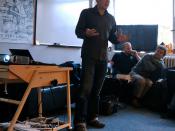Why are you Taking Philosophy?
What if a friend asked, "Why are you studying philosophy? It is an abstract useless subject"? How would I respond? I would ask my friend a series of questions in the attempt to reveal whether he has asked this questions based on assumptions or if he has reasoned out the practical uses of philosophy for himself and came to the conclusion that philosophy, "is an abstract useless subject". My friend's question has one main hidden assumption that I would attack: what is abstract is useless. To further illustrate my response to this hypothetical question I would like to create a hypothetical dialog in which I will do as I have said and attack my friend's assumptions through asking a series of my own questions. For the sake of this dialog my friends name will be David and I will be James.
David: Why are you studying philosophy? It is an abstract useless subject.
James: Well David I am glad you asked and I would be pleased to show you the answer
to your question, but to show you the answer I must ask you a series of questions that will lead you to the answer.
David: That is fine with me; ask away.
James: Great. My first question is how would you define philosophy?
David: I would say it is the examination of abstract useless issues.
James: Would you say that examination of an issue would help you gain knowledge on
that issue?
David: Yes.
James: What do you consider useful?
David: That's easy, anything that I can apply in life.
James: Would you say that the most useful things are those you can apply to what is most
important to you?
David: Yes.
James: What is most important to you?
David: I would have to say girls and money.
James: OK that's good, but do you mind if I take it step further?
David: What do you mean?
James: Well you said girls; by girls do you mean just girls or do you mean love and
relationships?
David: I mean love and relationships.
James: OK good, and why is money important to you?
David: Well I am not greedy or anything, I just always thought that if I had more money
it would mean I wouldn't have to work a lot and I could focus on things that would make me happy.
James: So money as a means of attaining happiness?
David: Yes.
James: But happiness is more important than money?
David: Yes, definitely.
James: All right, so far you have said that the examination of an issue would help you
gain knowledge of that issue, the most useful things are those that you can
apply to what is most important, and what is most important is love and
happiness.
David: That's right.
James: Now I'm going to ask you some different questions and I want you to bare with
me.
David: Shoot.
James: What makes a peanut butter & jelly sandwich?
David: Peanut butter, jelly, and bread.
James: Exactly, there is no arguing that. That is a concrete answer. Now what makes
people happy?
David: Umm.
James: That one is a little harder isn't it? It's ok you don't have to answer that right now.
But let me ask you this, how do you open a door?
David: You turn the handle and push.
James: Exactly, now how do you fall in love?
David: I don't know exactly.
James: Nor do I. Now would you say that the peanut butter question and the door
question were hard to answer or in other words abstract?
David: No they were not abstract.
James: Would you say that the love question and the happiness question were abstract?
David: Yes, definitely.
James: So the issues that are most important to you, love and happiness, are abstract.
David: That is what I said.
James: So what I have gathered from the questions I have asked you is that examining an
issue results in gaining knowledge on that issue, the most useful things are those
that you can apply to what is most important, what is most important is love and
happiness, and love and happiness are abstract issues.
David: Yes, that is what I have answered.
James: The first question I asked you was how you would define philosophy, and you
answered, "It is the examination of abstract useless issues." So if examining an
issue results in a gain of knowledge on that issue and the things that are most
important to you are abstract then studying philosophy (by your definition) will
result in gaining knowledge on issues that are most important. And if what is most
useful is what you can apply to what is most important then philosophy (by your
definition) must be useful.
David: Yes I can see that now, but are those the types of issues you examine in your
philosophy class?
James: That is exactly what we examine.
David: Oh.
James: I have one last question.
David: Go ahead.
James: Why do you think I am studying philosophy?
David: I would say that you are studying philosophy because some of the most important
issues and subjects in life are abstract, and to study philosophy is to better understand issues and subjects of importance in life.
James: That is a good answer to why I am studying philosophy, but it is an even better
answer to why you should study philosophy.
In this dialog I was using the Socratic method where by faulty reasoning and hidden assumptions are exposed by asking simple questions. The final conclusion that was drawn (to study philosophy is to better understand issues and subject of importance in life) by this dialog is in fact one of the main reasons I am studying philosophy. I also find it pleasurable to use the critical thinking tools I picked up last semester, and I figure there will be plenty of opportunities for that in this introduction to philosophy class.


